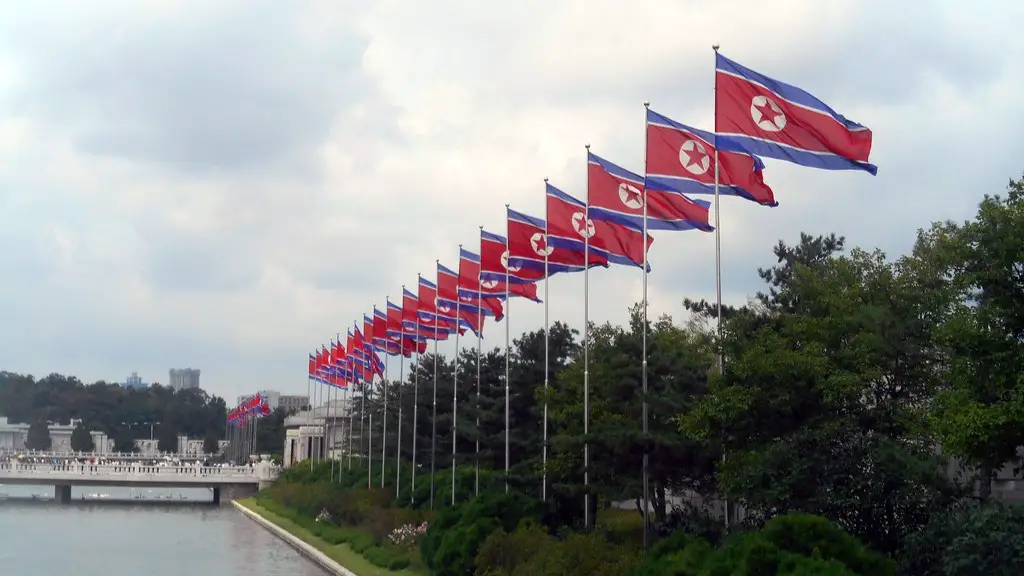As one of the most isolated, authoritarian countries on Earth, North Korea is often seen as a failed state. It is a nation whose economic, political and social systems have severe deficiencies, and it is a place where the population is denied basic human rights. The failed state status of North Korea has been attributed to a number of different factors, ranging from the oppressive regime’s reliance on a centrally-controlled, military-first approach to government, to its dependence on foreign aid and its failure to modernize the economy.
The country’s descent into poverty began in the late 1970s, when the North Korean government began to focus on military spending, instead of developing its economy. This was a direct result of the Cold War and North Korea’s stated policy of juche (“self-reliance”), which prevented the country from forming economic ties with foreign nations. As a result, the country soon found itself unable to modernize its industrial infrastructure or keep up with technological advances, which further exacerbated the nation’s economic woes.
In addition to its focus on military spending and its lack of ties to the global economy, North Korea’s failed state status has been greatly exacerbated by its decision to remain isolated from the world. North Korea’s policy of self-imposed isolation has resulted in the country’s being cut off from the global flow of information and capital, and it has left the economy unable to adapt to changing circumstances. The economic sanctions imposed by the United Nations, coupled with the country’s limited ability to conduct international trade, have further hampered North Korea’s economic prospects.
Another factor contributing to North Korea’s failed state status is the oppressive and authoritarian regime that has been in power there since the end of World War II. The regime has all but eliminated political and civil rights, leaving the population with few avenues to voice their dissatisfaction with the government, while at the same time making it nearly impossible to challenge the regime’s legitimacy. Furthermore, the North Korean government has been accused of using public executions and arbitrary detention to maintain power, and it has been widely reported that the regime is responsible for a wide range of human rights violations.
The oppressive nature of the regime has also had a negative effect on the country’s economy, with the government arbitrarily setting prices, shutting down businesses, and using coercion to control the labor force. This has resulted in a lack of foreign investment, as investors are unwilling to risk their capital in a country with an oppressive government and a lack of economic stability.
In addition to its economic policies, North Korea’s failed state status has been attributed to its heavy reliance on foreign aid to supply the population with basic necessities. The regime has a long history of requesting and receiving foreign aid, and while this has helped to alleviate poverty and make the country’s economy somewhat stable, it has also been a major drain on the country’s resources. Without foreign aid, North Korea would be unable to maintain a subsistence level of economic activity, and it would quickly become an even more failed state.
Environmental Fallout From The Regime
The oppressive North Korean regime has also had serious environmental ramifications for the country. In its attempt to control the population and its resources, the government has been accused of allowing industries to pollute the environment with impunity. In addition, the regime’s lack of investment in public health has led to the spread of infectious diseases, further harming the health of the North Korean population.
The North Korean government’s refusal to address environmental issues has also had serious consequences for its neighbors. Pollution from the North Korea has been found in neighboring countries, as airborne toxins and contaminated water have crossed international borders. This has caused significant health problems in neighboring countries, as well as economic costs, as the countries have had to contend with the increased costs of treating pollution-related illness and cleaning up contamination.
The North Korean government’s refusal to address economic and environmental issues has resulted in a dramatically lower standard of living for its population. According to the most recent figures, the poverty rate in North Korea is estimated to be at least 40%, with millions of people struggling to survive on $1.25 per day or less. In addition, the country faces a severe food insecurity crisis, with an estimated 18 million people in need of food assistance.
The Role Of The International Community
The international community has recognized the severity of the situation in North Korea and has taken measures to address the situation. In particular, the United Nations has imposed a range of economic sanctions and embargoes, with the aim of pressuring the North Korean government to change its ways. The sanctions have had a great impact on North Korea’s economy, but they have been criticized for harming the country’s population more than its leadership. Furthermore, the sanctions have failed to bring about the desired change, as the North Korean regime has proven to be resilient in the face of international pressure.
At the same time, the international community has offered assistance to North Korea in the form of aid and humanitarian relief. The United Nations, Western governments, and various aid organizations have all contributed to the effort to alleviate poverty and suffering in the country. The assistance, however, has not been able to penetrate the closed borders of North Korea, and the regime’s oppressive policies have greatly limited the effectiveness of the aid.
In addition to offering aid and assistance, the international community has also sought to engage North Korea in dialogue and negotiations. However, the North Korean regime has refused to engage in any meaningful dialogue, and the international community has been unable to persuade the country to change its policies. As a result, North Korea remains isolated, and its failed state status is unlikely to change anytime soon.
Humanitarian Crisis In The Country
The failed state status of North Korea has also led to a severe humanitarian crisis in the country. Millions of people are living in poverty, while the economic and political systems deny them basic rights and freedoms. In addition, the North Korean government has been accused of using public executions and arbitrary detention to maintain power, with the population having few avenues to voice their dissatisfaction. The population’s access to basic necessities, such as food, clothing, health care, and education, has been severely limited, which has resulted in high levels of malnutrition, disease, and illiteracy among the population.
Furthermore, the North Korean government has been accused of using public executions and arbitrary detention to maintain power. These oppressive practices have been widely condemned by the international community, and the United Nations has passed a number of resolutions calling on the North Korean government to end its human rights abuses. However, the regime has shown no sign of relenting and has continued to use these tactics to maintain power.
The oppressive environment in North Korea has also resulted in a large number of people seeking to escape the country. Thousands of North Koreans have attempted to flee the country, many of them making the dangerous journey by sea or land. In addition, the refugee crisis has been exacerbated by the clampdown on freedom of movement within the country, with the government prohibiting citizens from leaving their homes without permission.
Relationship With The US
The failed state status of North Korea has made it difficult for the country to establish and maintain relationships with other nations. The North Korean regime is hostile to foreign countries, including its closest ally, the United States. Relations between North Korea and the US have been strained for years, and have further deteriorated since the North Korean government accelerated its nuclear weapons program. The US has repeatedly condemned North Korea’s nuclear weapons program, and has imposed a wide range of economic sanctions on the country in an effort to force the regime to denuclearize.
At the same time, the US has also offered to engage in dialogue with North Korea, in an effort to persuade the regime to end its pursuit of nuclear weapons. The US has also proposed a number of aid packages to North Korea, as a way to build economic ties and foster dialogue. However, the North Korean regime has so far refused to engage in meaningful dialogue, and the US has been unable to persuade the country to change its policies.
In addition to its strained relationship with the US, North Korea has also had troubled relations with its regional neighbors. North Korea’s belligerent behavior and its nuclear weapons program have alarmed its neighbors, and tensions between the countries have risen in recent years. The North Korean government has also been accused of providing support to terrorist groups, further aggravating relations with its neighbors.
Conclusion
North Korea’s failed state status has been attributed to a number of different factors, ranging from its oppressive regime and its reliance on foreign aid, to its refusal to modernize its economy. The situation in North Korea has led to a severe humanitarian crisis in the country, with millions of people living in poverty and in fear of the government. In addition, the failed state status has strained North Korea’s relationships with its neighbors and with the US, making it difficult for the country to establish and maintain ties with the outside world.




